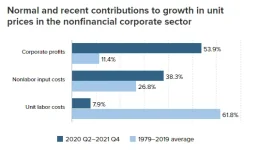- Joined
- Nov 28, 2011
- Messages
- 26,986
- Reaction score
- 24,300
- Gender
- Undisclosed
- Political Leaning
- Other
Just interjecting here.... I'm sure you're all shocked by that
2) The central banks are performing functions that are absolutely vital to the global financial system. Bitcoin isn't.
Currencies also need to be stable. However, BTC can never be stable, because there is no one who can stabilize it. That's why speculators love it.
No, wait, that's just absurd. Credit and FRB is far too useful to go away.
I'd add that from what I'm seeing, US legislation passed this week basically allows conventional banks a lot more options to work with crypto. If you think large banks won't be able to dominate the sector, you're in for a rude awakening. Here comes the new boss, same as the old boss....
We should also note that, especially in the past 40 years, we've repeatedly seen those "well-meaning small groups" rescue the global economy from disaster via monetary policy. And now what, you want to take away one of the few tools governments are willing to use to manage recessions? While ignoring how Big Crypto keeps melting down, stealing customer assets, and getting caught laundering money? Seems odd.

1) They are nowhere near as energy-intensive as Bitcoin. I've never seen anyone say that all the central banks combined use as much energy per hour as all of Poland.This is a gigantic topic in itself, and I will not have room in my response to go very deep. This line of thought ends in the oversimplification of this typical statement. " Bitcoin uses more electricity than x country! ". But simply, I would argue that debt-based central banks have to have support systems that are quite extensive as well.
2) The central banks are performing functions that are absolutely vital to the global financial system. Bitcoin isn't.
You, uh... do know that was its original purpose, right?I do not necessarily believe that Bitcoin has to become primarily currency. Not at first.
Currencies also need to be stable. However, BTC can never be stable, because there is no one who can stabilize it. That's why speculators love it.
What a shock.I think it can be an extremely successful store of value.
There are many cryptocreeps who will say anything to protect their holdings.There are many people in the Bitcoin world who see this way.
Considering that BTC is a failure as a currency, it seems the critics were correct, no?And to your point that Bitcoin is technically incapable of becoming transactional for the entire world,.. I think this was the argument made immediately after Satoshi's first post on the mailing list when he introduced the white paper.
How many years have you been saying that? Two?But layered systems are being developed that are already working for transactional Bitcoin.
Oh, you think crypto will reduce the dependency on credit? That's so cute!I think I have less faith in the debt-based central banking system and it being the best we can do than you. And taking the most central and basic control of money out of the hands of even well-meaning small groups of humans might just have an amazingly positive impact.
No, wait, that's just absurd. Credit and FRB is far too useful to go away.
I'd add that from what I'm seeing, US legislation passed this week basically allows conventional banks a lot more options to work with crypto. If you think large banks won't be able to dominate the sector, you're in for a rude awakening. Here comes the new boss, same as the old boss....
We should also note that, especially in the past 40 years, we've repeatedly seen those "well-meaning small groups" rescue the global economy from disaster via monetary policy. And now what, you want to take away one of the few tools governments are willing to use to manage recessions? While ignoring how Big Crypto keeps melting down, stealing customer assets, and getting caught laundering money? Seems odd.
Finally, I thank you for your thoughtful, even, intelligent posts. It's what I come to this site, craving, instead of the one-liners and name-calling that we do so much of here.





